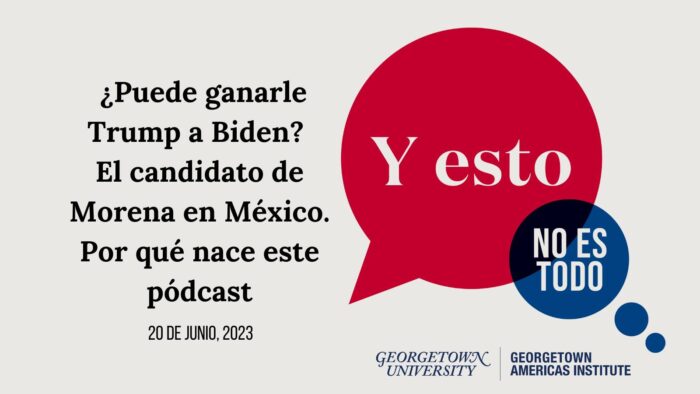
Then, the episode’s hosts announced the news of a different story: The podcast would end just a few weeks later.
The Washington Post’s Latino Caucus — a group of the Post’s guild members who are Latino — first broke the news of the show’s cancellation via Twitter on December 16. The Post also pulled the plug on its Spanish-language opinion section, which launched in 2019 around the same time as El Post.
1/ Not long ago, the @washingtonpost touted a global expansion that prioritized Spanish-language media in order to reach younger, more diverse audiences. Now, WaPo has cut verticals meant to do just that — @elpost & @postopinion_es — without notice to our newsroom or subscribers.
— WP Latino Caucus (@WPLatinoCaucus) December 16, 2022
By the time that episode aired, Iragorri was already in early talks to give the show a second life (with a new name and logo) in an unusual place: Georgetown University’s Americas Institute, an umbrella organization that brings together different initiatives related to Latin America across the university.
“Y esto no es todo” (translation: “And that’s not all”) launched Tuesday. The podcast will release new episodes Tuesday through Friday at 6:00 a.m. ET. Each 15- to 20-minute episode includes two to three in-depth explanations and discussions of major news stories and their impact on Latin America, then goes over a few other headlines.
“The name is an invitation to listen to the next day’s podcast,” Iragorri said.
Tómese un café y póngase los audífonos. Este es el episodio de hoy de @Yestonoestodo, el primero de esta nueva aventura junto a @pazrn y @EspinosaRadio. En esta capítulo aparecen @DoriToribio, claro, @KarolinaGilas y @alejandrowerne7 del @GUAmericas. Bienvenidos. https://t.co/9mEWRTbwPx
— Juan Carlos Iragorri (@jciragorri) June 20, 2023
The podcast’s hosts are Iragorri; Paz Rodríguez Niell, a political journalist for La Nación in Argentina; and Colombian radio journalist Jorge Espinosa. Verónica Calderón, a Mexican journalist who is currently the news bureau editor for Univision Noticias in Mexico City, and Spanish television journalist Dori Toribio will also join as contributors. (Espinosa and Toribio were the co-hosts of El Post.) John F. Burnett will produce the show. The podcast will be funded by the Institute and through listener donations. El Post was previously funded through advertising.
In the first episode, the co-hosts covered the 2024 U.S. presidential race, the frontrunners of Mexico’s ruling party, and an interview with Americas Institute director Alejandro Werner about why it’s important to publish the podcast.
The Americas Institute launched in 2021 and, over the last year, has offered research fellowships, awarded grants, and held events about economic growth, innovation, environmental issues, and social inclusion. Denisse Yanovich, the institute’s managing director, said she listened to El Washington Post almost every day. Part of what appealed to her about the original show was the diversity in voices and accents that made it feel inclusive of all Latin Americans, she said. When she heard that El Post was shutting down, she saw a fit for a new version of the show at Georgetown.
“A lot of Latin American officials and academics come to D.C.,” Yanovich said. “One of our objectives is to make Georgetown more visible in Latin America with high-quality content that is relevant for Latin Americans. The podcast is a perfect fit to achieve that mission. It’s also an opportunity to promote the work that Georgetown scholars are doing, and bring visions from other regions of the world to Latin America.”
A university is an interesting home for a general news podcast. Typically podcasts produced by universities focus on news at the school, university-funded research, or are interview-style talk shows. On Boston University’s The Crux of the Story, the hosts discuss major media stories from a PR perspective. The University of Oxford’s Futuremakers podcast focused on one major issue per season and had academics from the university debate them. California Community College’s Chancellor’s Office Podcast is hosted by Chancellor Daisy Gonzales, who brings in guests to talk about community colleges in each episode.
Spanish-language journalism in the United States is in a difficult position. In a country with 50 million Spanish speakers, national news outlets with global reach have often experimented with providing news in Spanish for a few years, before ultimately deeming the projects not worth continuing. Examples include The New York Times en Español (2016–2019), The Washington Post’s El Post podcast and Opinion section (2019–2022), and HuffPost Mexico (2016-2019).
At the local level, Spanish-language newspapers and digital news outlets face the same challenges as English-language news outlets in generating enough revenue to fund their journalism. Television networks like Univision and Telemundo have the most reach into Spanish-speaking communities but still face resource constraints. At the same time, radio has incredible reach into Latino communities the United States. Nielsen found last year that 97% of Latinos ages 18 and older listen to AM or FM radio at least monthly.
While the Institute’s work focuses more on Latin America than Latinos in the United States, the news podcast has the potential to bring in new listeners from all over the world, along with the fans of El Post.
“In the Spanish-speaking world, there’s a great radio culture,” Iragorri said. “People listen to the radio in the mornings to get information at 6:00 a.m., they listen to the programs in the evenings to keep them company…[the podcast can be a] companion while you drink your morning coffee, while you make fried eggs and some toast.”